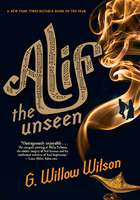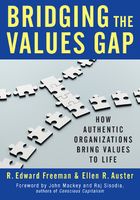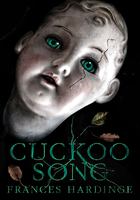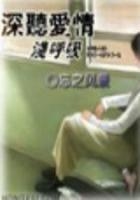Some days elapsed, and it appeared she was not likely to take much of a fancy to anybody in the house. She was not exactly naughty or wilful: she was far from disobedient; but an object less conducive to comfort-to tranquillity even-than she presented, it was scarcely possible to have before one's eyes. She moped: no grown person could have performed that uncheering business better; no furrowed face of adult exile, longing for Europe at Europe's antipodes, ever bore more legibly the signs of home sickness than did her infant visage. She seemed growing old and unearthly. I, Lucy Snowe, plead guiltless of that curse, an overheated and discursive imagination; but whenever, opening a room-door, I found her seated in a corner alone, her head in her pigmy hand, that room seemed to me not inhabited, but haunted.
And again, when of moonlight nights, on waking, I beheld her figure, white and conspicuous in its night-dress, kneeling upright in bed, and praying like some Catholic or Methodist enthusiast-some precocious fanatic or untimely saint-I scarcely know what thoughts I had; but they ran risk of being hardly more rational and healthy than that child's mind must have been.
I seldom caught a word of her prayers, for they were whispered low: sometimes, indeed, they were not whispered at all, but put up unuttered; such rare sentences as reached my ear still bore the burden, "Papa; my dear papa!" This, I perceived, was a one-idea'd nature; betraying that monomaniac tendency I have ever thought the most unfortunate with which man or woman can be cursed.
What might have been the end of this fretting, had it continued unchecked, can only be conjectured: it received, however, a sudden turn.
One afternoon, Mrs. Bretton, coaxing her from her usual station in a corner, had lifted her into the window-seat, and, by way of occupying her attention, told her to watch the passengers and count how many ladies should go down the street in a given time. She had sat listlessly, hardly looking, and not counting, when-my eye being fixed on hers-I witnessed in its iris and pupil a startling transfiguration. These sudden, dangerous natures-sensitive as they are called-offer many a curious spectacle to those whom a cooler temperament has secured from participation in their angular vagaries. The fixed and heavy gaze swum, trembled, then glittered in fire; the small, overcast brow cleared; the trivial and dejected features lit up; the sad countenance vanished, and in its place appeared a sudden eagerness, an intense expectancy. "It is!" were her words.
Like a bird or a shaft, or any other swift thing, she was gone from the room, How she got the house-door open I cannot tell; probably it might be ajar; perhaps Warren was in the way and obeyed her behest, which would be impetuous enough. I-watching calmly from the window-saw her, in her black frock and tiny braided apron (to pinafores she had an antipathy), dart half the length of the street; and, as I was on the point of turning, and quietly announcing to Mrs. Bretton that the child was run out mad, and ought instantly to be pursued, I saw her caught up, and rapt at once from my cool observation, and from the wondering stare of the passengers. A gentleman had done this good turn, and now, covering her with his cloak, advanced to restore her to the house whence he had seen her issue.
I concluded he would leave her in a servant's charge and withdraw; but he entered: having tarried a little while below, he came up-stairs.
His reception immediately explained that he was known to Mrs. Bretton. She recognised him; she greeted him, and yet she was fluttered, surprised, taken unawares. Her look and manner were even expostulatory; and in reply to these, rather than her words, he said,-"I could not help it, madam: I found it impossible to leave the country without seeing with my own eyes how she settled."
"But you will unsettle her."
"I hope not. And how is papa's little Polly?"
This question he addressed to Paulina, as he sat down and placed her gently on the ground before him.
"How is Polly's papa?" was the reply, as she leaned on his knee, and gazed up into his face.
It was not a noisy, not a wordy scene: for that I was thankful; but it was a scene of feeling too brimful, and which, because the cup did not foam up high or furiously overflow, only oppressed one the more. On all occasions of vehement, unrestrained expansion, a sense of disdain or ridicule comes to the weary spectator's relief; whereas I have ever felt most burdensome that sort of sensibility which bends of its own will, a giant slave under the sway of good sense.
Mr. Home was a stern-featured-perhaps I should rather say, a hard-featured man: his forehead was knotty, and his cheekbones were marked and prominent. The character of his face was quite Scotch; but there was feeling in his eye, and emotion in his now agitated countenance. His northern accent in speaking harmonised with his physiognomy. He was at once proud-looking and homely-looking. He laid his hand on the child's uplifted head. She said-"Kiss Polly."
He kissed her. I wished she would utter some hysterical cry, so that I might get relief and be at ease. She made wonderfully little noise: she seemed to have got what she wanted-all she wanted, and to be in a trance of content. Neither in mien nor in features was this creature like her sire, and yet she was of his strain: her mind had been filled from his, as the cup from the flagon.
Indisputably, Mr. Home owned manly self-control, however he might secretly feel on some matters. "Polly," he said, looking down on his little girl, "go into the hall; you will see papa's great-coat lying on a chair; put your hand into the pockets, you will find a pocket-handkerchief there; bring it to me."
She obeyed; went and returned deftly and nimbly. He was talking to Mrs. Bretton when she came back, and she waited with the handkerchief in her hand. It was a picture, in its way, to see her, with her tiny stature, and trim, neat shape, standing at his knee. Seeing that he continued to talk, apparently unconscious of her return, she took his hand, opened the unresisting fingers, insinuated into them the handkerchief, and closed them upon it one by one. He still seemed not to see or to feel her; but by-and-by, he lifted her to his knee; she nestled against him, and though neither looked at nor spoke to the other for an hour following, I suppose both were satisfied.
During tea, the minute thing's movements and behaviour gave, as usual, full occupation to the eye. First she directed Warren, as he placed the chairs.
"Put papa's chair here, and mine near it, between papa and Mrs. Bretton: I must hand his tea."
She took her own seat, and beckoned with her hand to her father.
"Be near me, as if we were at home, papa."
And again, as she intercepted his cup in passing, and would stir the sugar, and put in the cream herself, "I always did it for you at home; papa: nobody could do it as well, not even your own self."
Throughout the meal she continued her attentions: rather absurd they were. The sugar-tongs were too wide for one of her hands, and she had to use both in wielding them; the weight of the silver cream-ewer, the bread-and-butter plates, the very cup and saucer, tasked her insufficient strength and dexterity; but she would lift this, hand that, and luckily contrived through it all to break nothing. Candidly speaking, I thought her a little busy-body; but her father, blind like other parents, seemed perfectly content to let her wait on him, and even wonderfully soothed by her offices.
"She is my comfort!" he could not help saying to Mrs. Bretton. That lady had her own "comfort" and nonpareil on a much larger scale, and, for the moment, absent; so she sympathised with his foible.
This second "comfort" came on the stage in the course of the evening. I knew this day had been fixed for his return, and was aware that Mrs. Bretton had been expecting him through all its hours. We were seated round the fire, after tea, when Graham joined our circle: I should rather say, broke it up-for, of course, his arrival made a bustle; and then, as Mr. Graham was fasting, there was refreshment to be provided. He and Mr. Home met as old acquaintance; of the little girl he took no notice for a time.
His meal over, and numerous questions from his mother answered, he turned from the table to the hearth. Opposite where he had placed himself was seated Mr. Home, and at his elbow, the child. When I say child I use an inappropriate and undescriptive term-a term suggesting any picture rather than that of the demure little person in a mourning frock and white chemisette, that might just have fitted a good-sized doll-perched now on a high chair beside a stand, whereon was her toy work-box of white varnished wood, and holding in her hands a shred of a handkerchief, which she was professing to hem, and at which she bored perseveringly with a needle, that in her fingers seemed almost a skewer, pricking herself ever and anon, marking the cambric with a track of minute red dots; occasionally starting when the perverse weapon-swerving from her control-inflicted a deeper stab than usual; but still silent, diligent, absorbed, womanly.
Graham was at that time a handsome, faithless-looking youth of sixteen. I say faithless-looking, not because he was really of a very perfidious disposition, but because the epithet strikes me as proper to describe the fair, Celtic (not Saxon) character of his good looks; his waved light auburn hair, his supple symmetry, his smile frequent, and destitute neither of fascination nor of subtlety (in no bad sense). A spoiled, whimsical boy he was in those days.
"Mother," he said, after eyeing the little figure before him in silence for some time, and when the temporary absence of Mr. Home from the room relieved him from the half-laughing bashfulness, which was all he knew of timidity--"Mother, I see a young lady in the present society to whom I have not been introduced."
"Mr. Home's little girl, I suppose you mean," said his mother.
"Indeed, ma'am," replied her son, "I consider your expression of the least ceremonious: Miss Home I should certainly have said, in venturing to speak of the gentlewoman to whom I allude."
"Now, Graham, I will not have that child teased. Don't flatter yourself that I shall suffer you to make her your butt."
"Miss Home," pursued Graham, undeterred by his mother's remonstrance, "might I have the honour to introduce myself, since no one else seems willing to render you and me that service? Your slave, John Graham Bretton."
She looked at him; he rose and bowed quite gravely. She deliberately put down thimble, scissors, work; descended with precaution from her perch, and curtsying with unspeakable seriousness, said, "How do you do?"
"I have the honour to be in fair health, only in some measure fatigued with a hurried journey. I hope, ma'am, I see you well?"
"Tor-rer-ably well," was the ambitious reply of the little woman and she now essayed to regain her former elevation, but finding this could not be done without some climbing and straining-a sacrifice of decorum not to be thought of-and being utterly disdainful of aid in the presence of a strange young gentleman, she relinquished the high chair for a low stool: towards that low stool Graham drew in his chair.
"I hope, ma'am, the present residence, my mother's house, appears to you a convenient place of abode?"
"Not par-tic-er-er-ly; I want to go home."
"A natural and laudable desire, ma'am; but one which, notwithstanding, I shall do my best to oppose. I reckon on being able to get out of you a little of that precious commodity called amusement, which mamma and Mistress Snowe there fail to yield me."
"I shall have to go with papa soon: I shall not stay long at your mother's."
"Yes, yes; you will stay with me, I am sure. I have a pony on which you shall ride, and no end of books with pictures to show you."
"Are you going to live here now?"
"I am. Does that please you? Do you like me?"
"No."
"Why?"
"I think you queer."
"My face, ma'am?"
"Your face and all about you: You have long red hair."
"Auburn hair, if you please: mamma, calls it auburn, or golden, and so do all her friends. But even with my 'long red hair'" (and he waved his mane with a sort of triumph-tawny he himself well knew that it was, and he was proud of the leonine hue), "I cannot possibly be queerer than is your ladyship."
"You call me queer?"
"Certainly."
(After a pause), "I think I shall go to bed."
"A little thing like you ought to have been in bed many hours since; but you probably sat up in the expectation of seeing me?"
"No, indeed."
"You certainly wished to enjoy the pleasure of my society. You knew I was coming home, and would wait to have a look at me."
"I sat up for papa, and not for you."
"Very good, Miss Home. I am going to be a favourite: preferred before papa soon, I daresay."
She wished Mrs. Bretton and myself good-night; she seemed hesitating whether Graham's deserts entitled him to the same attention, when he caught her up with one hand, and with that one hand held her poised aloft above his head. She saw herself thus lifted up on high, in the glass over the fireplace. The suddenness, the freedom, the disrespect of the action were too much.
"For shame, Mr. Graham!" was her indignant cry, "put me down!"-and when again on her feet, "I wonder what you would think of me if I were to treat you in that way, lifting you with my hand" (raising that mighty member) "as Warren lifts the little cat."
So saying, she departed.















